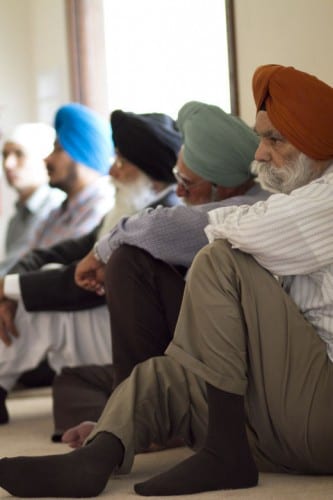

 —After many years of wearing a turban, Randee Talwar stopped in 2003.
—After many years of wearing a turban, Randee Talwar stopped in 2003.
He was living in New Jersey at the time, and emotions were still exceedingly raw over the attacks by Islamic terrorists on Sept. 11, 2001. It was a difficult time to be Muslim in the U.S. — or to be anyone confused for Muslim.
Such was the case with Talwar, who practices Sikhism, a distinct religion. People swore at him from passing cars and gave him dirty looks on the street. He worried about the safety of his 5-year-old daughter playing in the family’s front yard.
“I was not fearful for myself but for my family,” said Talwar, 46, who now lives with his family in Madison and owns two hotels in the area. “I felt it would be better to keep my religion a private matter.”
New research shows just how uninformed or misinformed most Americans are about Sikhism, the fifth-largest organized religion in the world. In a national survey of 1,144 people commissioned by the National Sikh Campaign, 60 percent admitted knowing nothing at all about Sikh Americans.
The survey also found that people sometimes have difficulty distinguishing between Sikhs and Muslims.
Shown a photo of a turbaned male Sikh, survey respondents wrongly assumed he was Muslim 20 percent of the time.
None of this surprises Talwar or the many others who worship at the Sikh temple in Middleton, called Gurdwara Sahib.
“That survey hits right at the heart of the issue: A lot of people don’t know us,” said Surinder Pangli, a temple board member.
He recalled a post-9/11 incident at a Monona convenience store in which his brother, working behind the counter, was called a “towel head” by a customer and told to go home.
Sikhism is an independent religion, not an offshoot of Islam or Hinduism. It was founded about 500 years ago on the Indian subcontinent.
Its first guru, Nanak Sahib, said he heard God’s call to dedicate himself to the service of humanity. Followers believe in one God and that he is the same God for all people of all religions, just known by different names.
When Pangli meets someone who’s never heard of Sikhism, he first stresses that it’s a religion that doesn’t discriminate. Sikhism preaches that people of different races, religions, or sex are all equal in the eyes of God.
He then talks about the three pillars Sikhs live by: work hard for a living; share what you have with the less fortunate; and remember God every day, all day, in everything you do.
With their belief in one God, Sikhs consider Muslims their brothers and sisters in humankind. So they don’t want to seem as if they’re protesting too much when they attempt to differentiate themselves. Yet confusion between the two religions has had tragic results for Sikhs in this country.
Since 9/11, hate crimes against Sikhs have dramatically increased.
In 2012, a white supremacist shot and killed six people and then himself at a Sikh temple in the Milwaukee suburb of Oak Creek.
“This was a very welcoming country before 9/11,” said Inderbans Brar, another board member of Middleton’s temple. “Whenever you have a big ‘pop’ like that happen, the majority population is going to go into a defensive position and the minority population will pay the price. It’s human nature. We paid a price for 9/11, even though we had no part of it.”
The Oak Creek killings, horrific as they were, did allow Madison-area Sikhs to explain themselves to the media and to neighbors in ways not often available, Talwar said.
He and some of the youth from the temple gave presentations at several area Protestant churches, and they were guests on a WORT radio talk show.
“There was so much interest in us after Oak Creek,” said Balwinder Singh Seerha, president of the temple’s management committee. “We had 40 to 50 people come on one day to see how we worship.”
The temple is at 6970 Century Ave., not far from the Middleton Copps grocery store. About 150 Sikhs worship there on a typical Sunday. Most of the adult members are first-generation immigrants from India, Seerha said.
Guests are always welcome. People typically begin gathering at the temple about 10 a.m. on Sundays for several hours of music and communal prayer. It is customary for people to come and go throughout the morning, Seerha said.
Services are led by a priest, who is a full-time employee of the temple. A free meal follows at 1 p.m.
The national survey uncovered a big upside. Most people are curious about Sikhism, and once they learn more, they usually feel warmly toward the religion.
Roopak Talwar, who works in information technology and is Randee Talwar’s wife, said she has found this to be the case in her interactions with co-workers and neighbors.
“When they find out that we are for freedom and equality and that the religion was founded to get rid of the caste system, they are very receptive,” she said. “These are the values of most Americans.”





http://americanturban.com/2012/08/12/reader-sikhs-should-abolish-the-turban/
[…] http://www.sikh24.com/2015/02/19/in-the-spirit-sikhs-who-worship-in-middleton-hope-to-change-survey-… […]